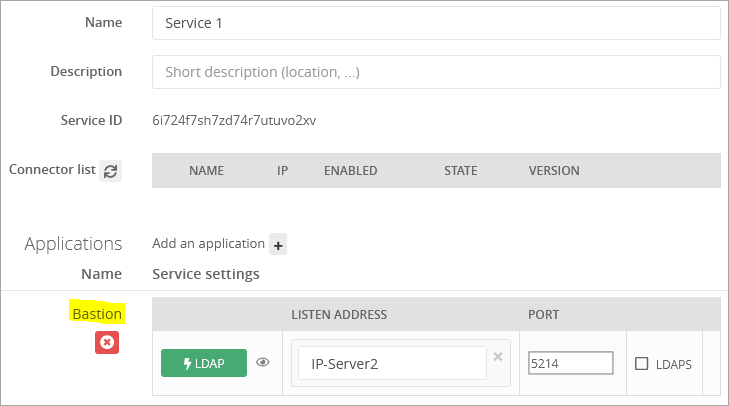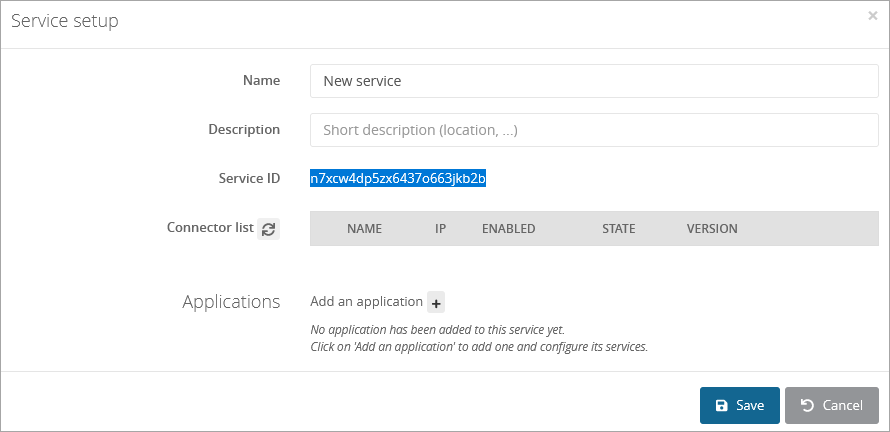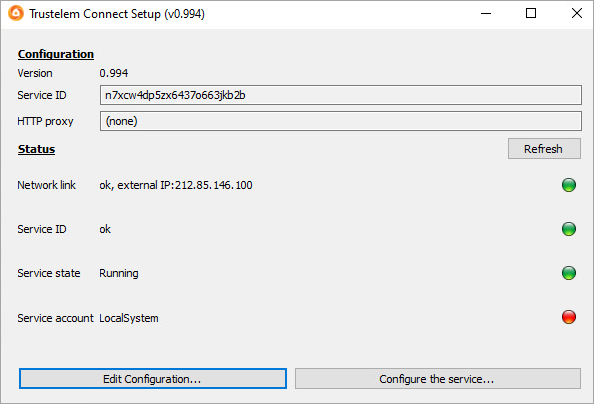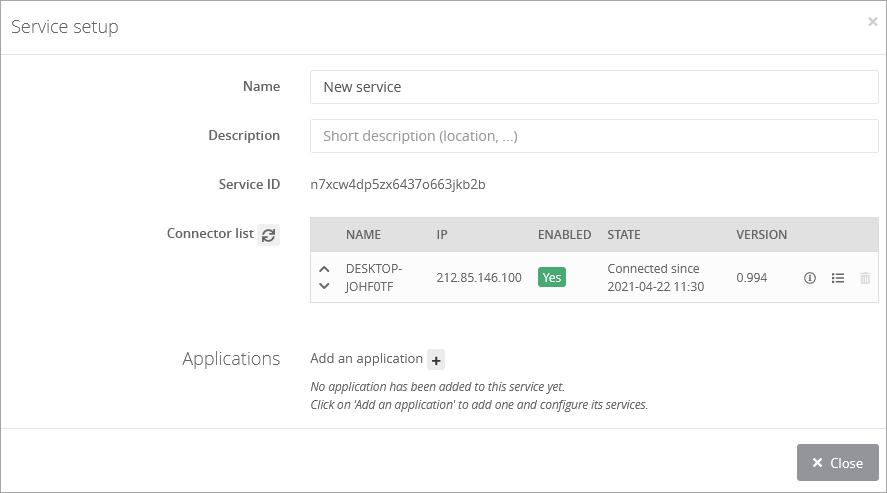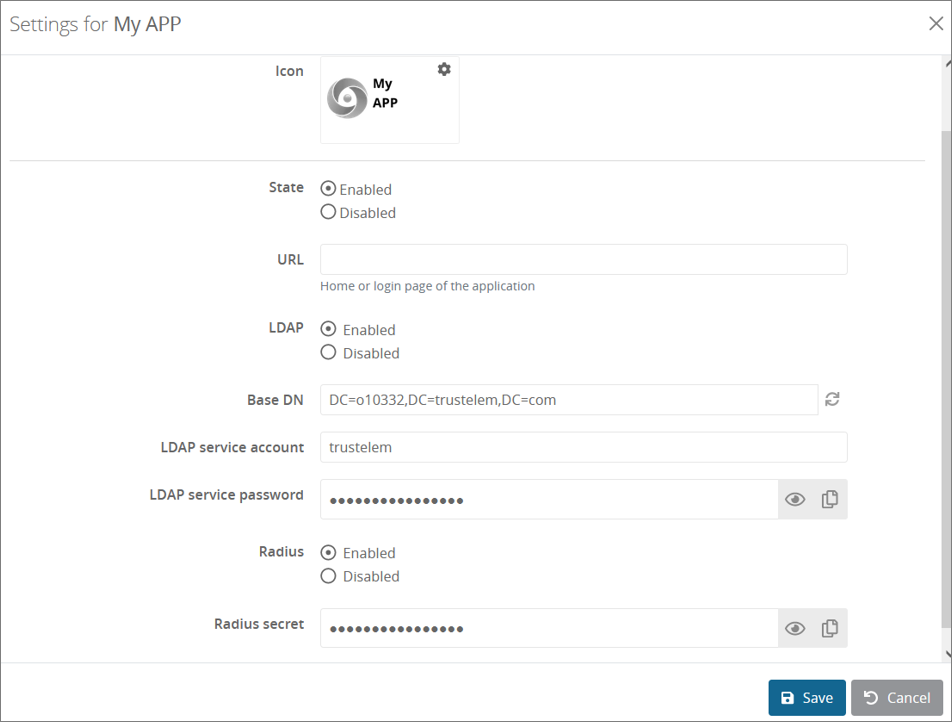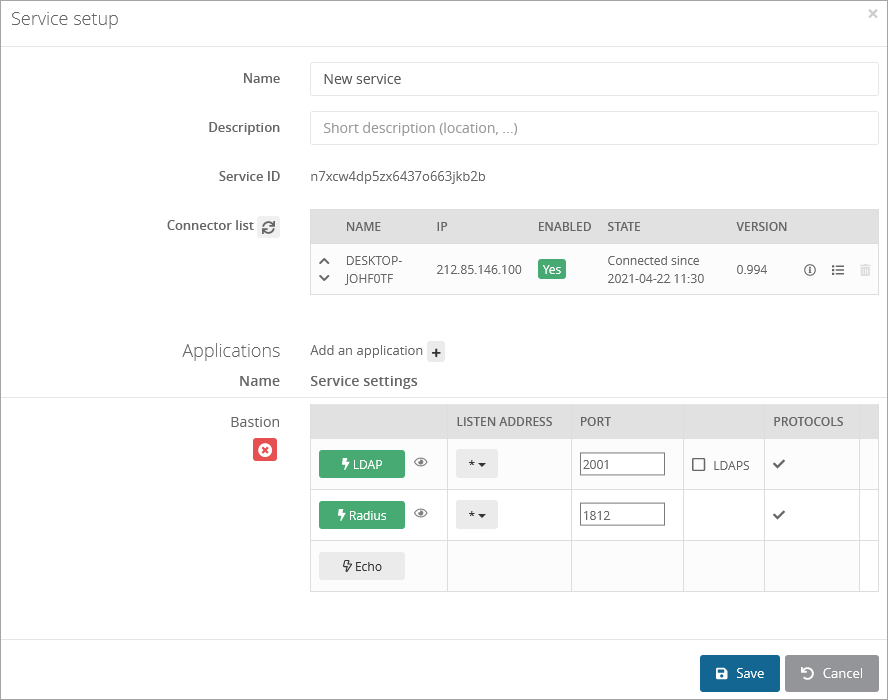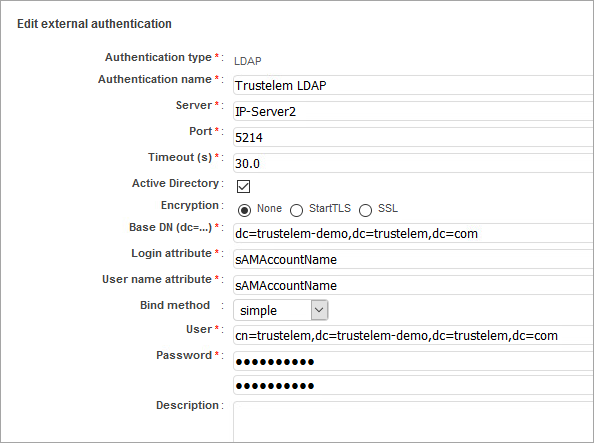LDAP-Radius - Trustelem Connect
Contents
- How does it work?
- Prerequisites
- Setup Trustelem Connect on a Windows machine
- Setup Trustelem Connect on a Linux machine
- Setup an application to use Trustelem Connect
- Debug
How does it work?
The goal is to use Trustelem database to provision and or authenticate users on an application using LDAP or Radius.
To do so, a connector, Trustelem Connect, is installed on a local customer server and has the role of LDAP server / Radius server. When it receives a request (LDAP search, LDAP bind, Radius Access request, Radius Challenge request) then it sends the request to Trustelem.
1/ During the setup, Trustelem Connect opens a websocket to Trustelem services using port 443.
Note: with the websocket, information is encrypted by TLS protocol and with an additional symmetric encryption.
Trustelem Connect also opens on the local machine, TCP or UDP ports on a specified local IP, based on the Trustelem setup.
One opened port matches one protocol for one application on Trustelem
For instance, I made the setup of Trustelem Connect, linked a Bastion application, and choose to use the port 5214 on the IP IP-Server2 for the protocol LDAP
2/ The application makes a search/authenticate request and sends it to Trustelem Connect on the defined port using LDAP or Radius.
With the previous example, the protocol is LDAP, the IP of the LDAP server is IP-Server2, the port is 5214
3/ Trustelem Connect uses the websocket to send the request to Trustelem services:
4/ As said before, on Trustelem the port is associated to a specific protocol and application.
Trustelem examines the access rules related to these protocol and application, and returns the answer to Trustelem Connect using the websocket.
With the previous example:
- If Trustelem receives a search request, it returns users who have an LDAP access-rule for the application Bastion.
- If Trustelem receives an authentication request, it returns the validation/invalidation of the credentials based on the Bastion LDAP access rule
5/ Trustelem Connect forwards the answer to the application using LDAP or Radius.
Prerequisites
- Prepare a VM, Windows Server or Linux, with minimal resources for the OS
- If you already have a VM for Trustelem ADConnect, you can use the same
- If you have only one VM which is down, the link to your application is down too..
- The recommendation is 2 VM at least, to have a failover system
- Download Trustelem Connect on the VM (.exe or .tgz depending of the OS)
- The flow from the application to the VM should be opened for the IP/port/protocol defined in the Service setup
- usually tcp port 2001 for LDAP, and udp port 1812 for Radius
- The flow from the VM to https://admin.trustelem.com should be opened (IP: 185.4.44.22)
- tcp port 443
- (optional) A service account with "read only" rights should be created on your Active Directory
Setup TrustelemConnect on a Windows machine
In your Trustelem administration page:
-
Go to the Services tab.
-
Click on the button + Create a service and copy the service ID.
On your server:
- Start the setup (Trustelem Connect.exe), and paste your service ID.
- If you have a proxy, complete the field HTTP Proxy with the value:
https://username:password@proxy_IP:proxy_port - Click on Validate the Configuration
- Then if you want to use LDAPs, on the Trustelem Connect folder, add a config.ini file and provide the following information (adapted to your own repository and your own certifiates) :
tls_cert = "C:\Program Files (x86)\Trustelem\connector.crt"
tls_cert_key = "C:\Program Files (x86)\Trustelem\connector.key"
- Start the service.
In your Trustelem administration page
-
Refresh your Services page.
-
Turn on the service by clicking on No.
You now have a functional connector.
Setup Trustelem Connect on a Linux machine
In your Trustelem administration page:
-
Go to the Services tab.
-
Click on the button + Create a service and copy the service ID.
On your server:
- Install the connector as a service with the setup.sh script launch with root privilege.
- To complete the configuration, edit /opt/wallix/trustelem-connect/config.ini file containing the synchronization id.
- A sample minimal config.ini would be:
service_id = 2jy34wpcohrhdytr6hutym6qfi2l7nnw
state_dir = run/
# if there is a proxy
proxy = https://username:password@proxy_IP:proxy_port
- The run folder must have read write rights for the trustelem user.
- You can add your own X509 certificate for ldaps and starttls. Accepted format is PEM.
tls_cert = run/connector.crt
tls_cert_key = run/connector.key
- After that, you can start the service with: systemctl start trustelem-connect.service
- The service will run with the user trustelem
In your Trustelem administration page
-
Refresh your Services page.
-
Turn on the service by clicking on No.
You now have a functional connector.
Setup an application to use Trustelem Connect
Note: for WALLIX Bastion and WALLIX Access Manager, you should watch the dedicated documentation instead of this chapter.
On your Trustelem administration page:
-
Go to the Apps tab.
-
Click on + Add an application
-
Choose either a pre-integrated application or a generic model depending on your need.
If you want to use only LDAP / Radius (no additional SAML/OpenID Connect) the generic Basic no SSO model should be used. -
Turn on LDAP and/or Radius.
-
Go back to the previously configured service and click on Add an application +
-
Click on LDAP and/or Radius button(s) to enable the protocol, then enter the listen address and port
Notes:- the listen address can be localhost, all existing IP address on the machine = *, or a specific IP = ...
- this will open the defined udp (Radius) or tcp (LDAP) port on the machine running Trustelem Connect on the IP 127.0.0.1 (localhost) OR on all local IPs (*) OR on a specific local IP (...)
- if you have a dedicated VM for the connector, choose *
-
If you have setup Trustelem Connect to use LDAPS, then check LDAPS
-
Click on Save
Trustelem is now ready to reply to applications sending requests to TrustelemConnect with the correct port and IP.
Of course, you need to create the access rules to defined which users can use the application
https://trustelem-doc.wallix.com/books/trustelem-administration/page/access-rules
On your your application setup:
Add a LDAP and/or Radius setup, based on the information provided by Trustelem:
- The IP / FQDN of the LDAP or Radius server is the IP / FQDN of the machine running Trustelem Connect
- The port is defined in the Services tab
- For a LDAP server
- The DN / user account / user account password are provided on the setup of the Trustelem application. These values can be modified but except for specific situations, there is no reason to change them.
- If you have to choose between an Active Directory server or a LDAP server, you should choose Active Directory. Trustelem tries to replicate how an Active Directory answers.
- A user CN looks like that:
CN=my_user,DC=my_trustelem_domain,DC=trustelem,DC=com
- A group CN looks like that:
CN=my_group,OU=Groups,DC=my_trustelem_domain,DC=trustelem,DC=com
- A Trustelem local user must have the login sets to mail
- A user synchronized from Active Directory can have the login sets to sAMAccountName, userPrincipalName or mail
- If you want to use MFA with push notification with LDAP had a sufficient timeout to let the time to users to validate the notification
- For a Radius server the secret is provided on the setup of the Trustelem application.
With the example used in the first chapter, the setup is:
Debug
The connector doesn't appear in the setup page on the admin page
- ping admin.trustelem.com on the machine running the connector to verify the outgoing flows
- verify the synchronization ID
- verify the proxy setup
- if the VM is a Windows machine, verify that you clicked on Validate on Trustelem Connect program
The LDAP or Radius authentication is no working
- Go on your Trustelm Logs page and see if you have LDAP or Radius logs. If yes, the connector is working and you should know why the authentication failed:
- if the user is not found, is the login attribute correct?
- if the user doesn't have the permission for the app, is your access rule correct?
- if the user doesn't have a 2nd factor, is your enrollment process correct?
- If your application tries to do a LDAP search and doesn't have access rule (LDAP 1 or 2 factors), no users will be found but you will not see any logs because it is not a bug
- Go on your Service setup and verify if the listen address is correct (should be * if the VM is dedicated to Trustelem)
- On the same page, see the port defined and the setup information clicking on the eye button
- Verify the setup of the application: server IP, port, DN/account/password for LDAP, secret for Radius
- Verify if the flow from the app to the VM running the connector is opened. If you have a doubt, use Wireshark on Windows or tcpdump on Linux.
/!\ tcpdump displays the flow received, before applying local firewall rules. So if you are on Linux and see the requests, you should verify if there is a local firewall.

